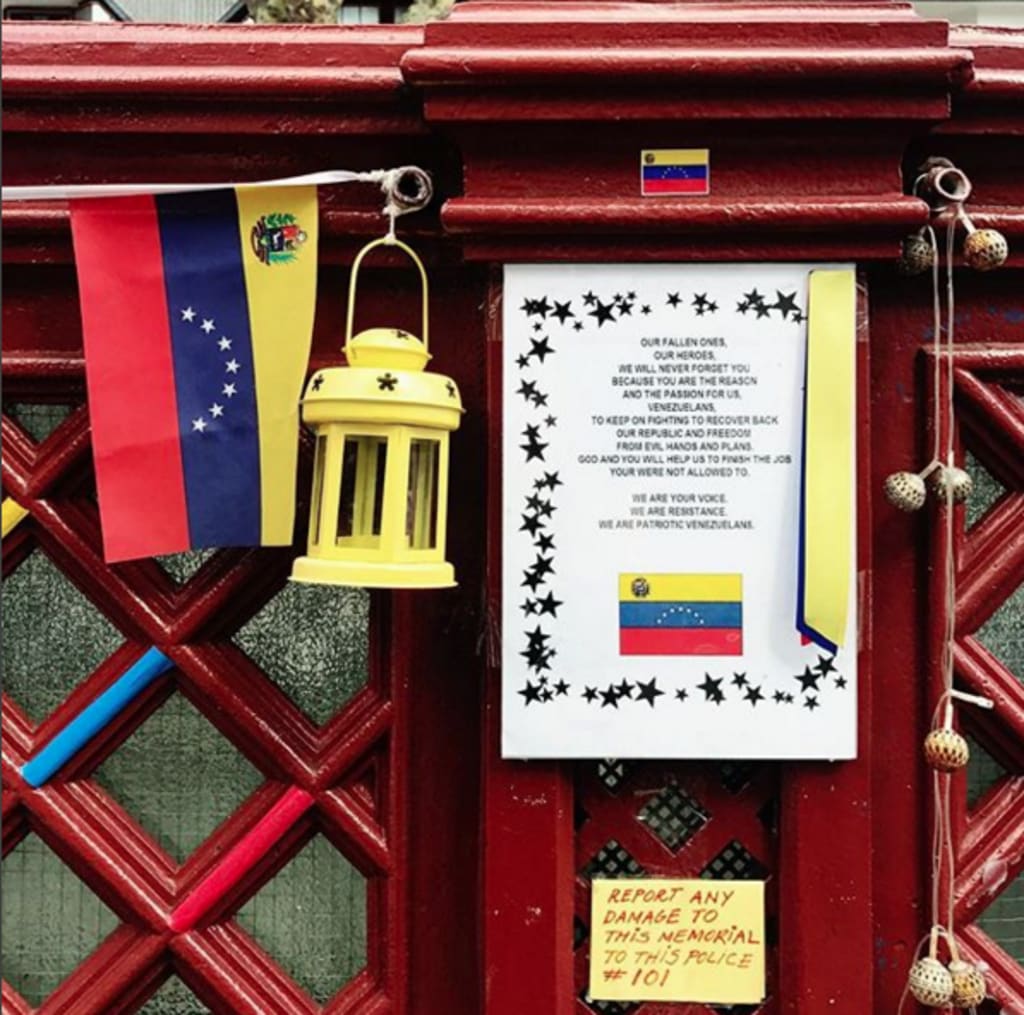The Lucky Refugees
The untold story of Venezuelans abroad.

Ever since I was little I remember moving from country to country, crying to my parents because—yet again—I had to make new friends and a new life.
By the time I was eight, I actually liked it and would even tell my dad I was bored when we stayed in Venezuela for ten years. In the end, I grew up seeing myself as a Nomad, and got used to moving and learning new cultures.
I recently discovered that for many Venezuelans out of Venezuela, that isn’t the case. The more I talk to them, the more I find that some of them didn’t leave voluntarily. I consider them refugees but, another type of refugee: The “Lucky” Refugees.
Even though our country isn’t officially at war, you can still get killed by voicing your opinion.
Last year, a total of 127 peaceful protesters died and 1,351 were imprisoned. A big percentage of them were underage.
One of the most recent atrocities was the massacre of a rebellious group leaded by Oscar Perez. They found themselves trapped and surrendered, but Maduro ordered to have them killed anyways.
The worst part was that the families weren't allowed to recover the bodies and the government buried them without their consent.
Some of you may not know this, but Venezuela is a “hot mess.” It has been for a long time—maybe longer than you can recall—because “Chavistas” have been in power for soon-to-be twenty years.
Before that, though, Venezuela was known as South America’s Switzerland. Venezuela’s position twenty years ago was so magnificent that my father, an Argentinian, felt he won the lottery when he landed a job in the tropical country that was rumoured to have the most beautiful women in the world.
Today, the once-immigrants are becoming emigrants—not exactly because they want to, but because they feel obliged to.
Venezuela is a country that seems to be stuck in two parallel universes. In one, people pretend to live a normal life and will spend a minimum wage salary on lunch (because that is how crazy the inflation is). They’ll earn their salary in dollars and exchange it in the black market and live like kings and queens in a kingdom of poverty and insecurity. However, not even these people can escape the shortage of basic supplies in the groceries and will have limitations on how many bottles of milk or bread they can take home—that is—when there is actually milk and bread in the grocery store. Everyone has to fight for toilet paper, because the country ran out and the president will actually tell you to “eat less” to justify this shortage. You’ll also hear friends talking constantly about how they got kidnapped last weekend, as if it were normal, because we eventually got used to it.
On the other side of the world, people are starving and dying of hunger because they can’t afford access to the black market. Medical supplies are also lacking, and causing hundreds of deaths per year.
To top it off, getting out of this nightmare is an odyssey. More than four years ago, a lot of airlines stopped travelling to Venezuela because the government owed them money. I was living in Paris when Air France decided to stopped flying to Venezuela. In order to visit my family, I had to go to Colombia and then take a flight with a local company that could fly to Caracas.
While I studied in Paris I remember talking with a girl that was excited to go back to her country as soon as she graduated. She turned to me and said, “What are you going to do? It’s really sad that you can’t go back to your country.” It had never even crossed my mind, but when I thought about it, she was absolutely right.
I haven’t lived in Venezuela since the year I left in 2010, and I haven’t been back since the past presidential elections in 2013.
My parents also had to leave two years ago—not under positive circumstances. My dad was dreaming of retiring in the sunny beaches of Venezuela, waking up every morning to blue skies and the majestic Avila mountain. My parents fell into that "lucky refugee" category. They are lucky, because they could leave on a plane on legal terms and start over. It isn’t easy, but most Venezuelans are well-prepared hard workers and can make ends meet.
Unfortunately, the only way to know what happens in the country is by following people on Twitter and Instagram, because the government owns all the local media. As lucky refugees, we watch from afar as our country is being destroyed little-by-little. We can’t do anything and the feeling of impotence hurts more than you can imagine. International news channels don't mention us as much as I feel they should, and there is no solid support from countries surrounding us. Better yet, some have even closed their borders to us.
I’ve decided to write this in hopes that this can help spread the word of what is happening in that beautiful, but wounded, country. I write this in the hopes that some can understand how lucky they are to live in proper democracy, and how lucky they are to be close to their loved ones. Finally, I write this because I know how easy it is to take things for granted.
To all the Venezuelans living abroad: there are more than four-million of us "lucky refugees" in the world. It is our duty to tell the untold-story of a once wonderful country that seems to be forgotten.
For more information you can follow: (content is in Spanish)
"I'm 17 years old, I'm not studying right now because I'm leaving the country in order to have a future but I really don't want to leave Venezuela.This is my country, I was born here, I'm fighting for my country.The battle of a few is worth the future of many"
- Neomar Lander (17 years old)
1999- 2017
Died June 7th, from a teargas bomb thrown at his chest.
About the Creator
Maria Eugenia D'Angelo
Maria-Eugenia is currently based in London.






Comments
There are no comments for this story
Be the first to respond and start the conversation.